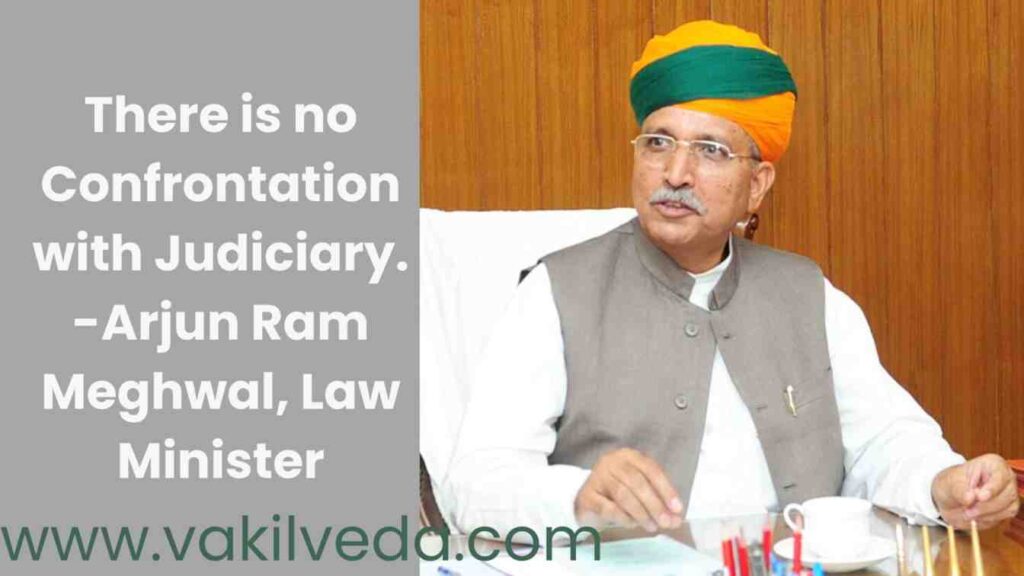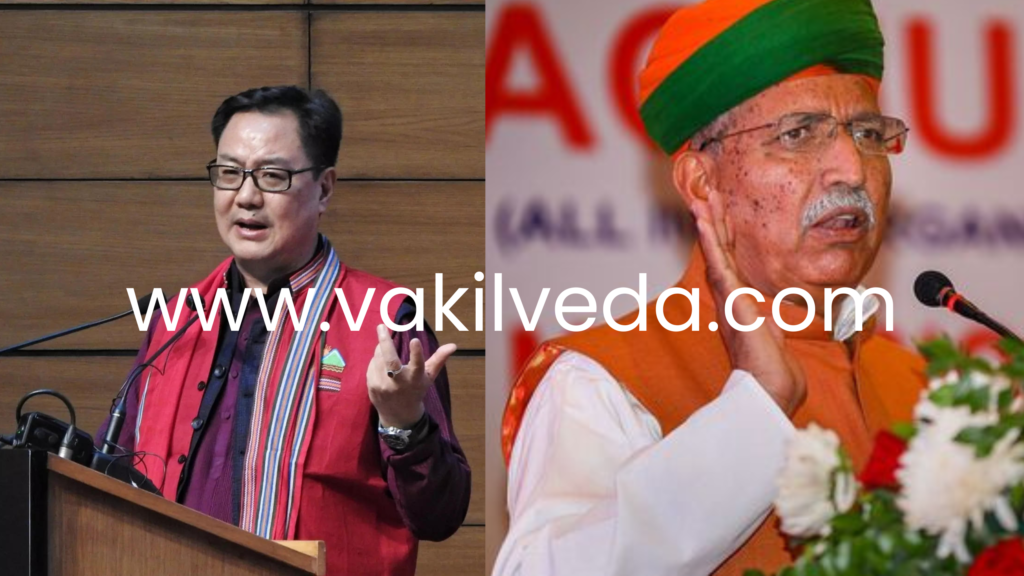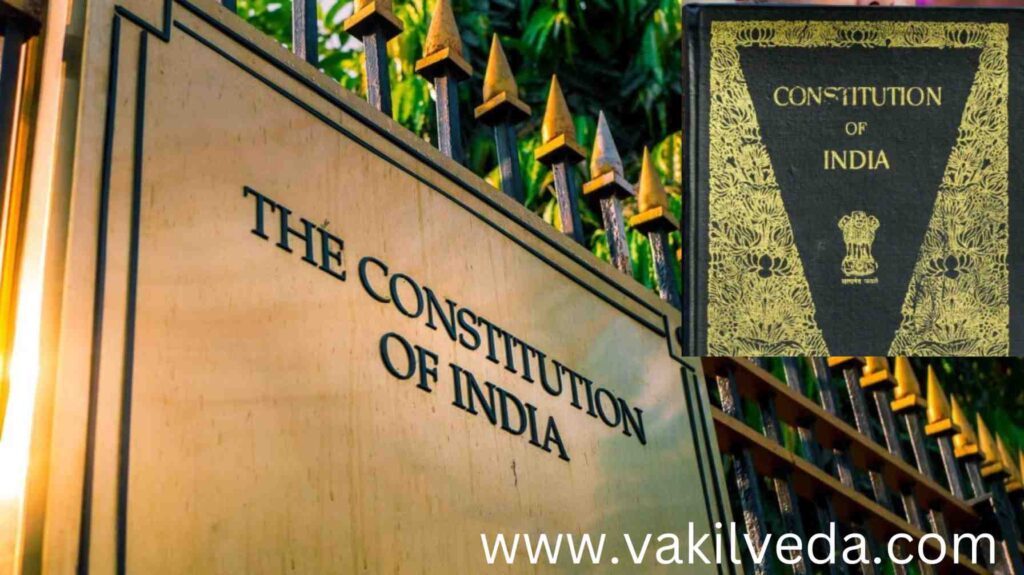
Arjun Ram Meghwal was given independent charge of the Union Ministry of Law and Justice and on 18 May 2023, he took charge of the Ministry. Former Law Minister Kiren Rijiju, 51, was allocated the Ministry of Earth Sciences portfolio. Mr. Meghwal was formerly Minister of State for Parliamentary Affairs and MoS Culture. The main reason behind doing so is the ongoing standoff between Mr. Kiren Rijiju and the Judiciary. Which has impacted the BJP negatively, very much.
Kiran Rijiju-
Kiren Rijiju, 51 years old politician is from Arunachal Pradesh and currently holds the charge of the Ministry of Earth Sciences. His father’s is Rinchin Kharu and his mother’s name is Chirai Rijiju. His father was the first protem speaker of Arunachal Pradesh who gave an oath to the Members of the First State Legislative Assembly. He completed his B.A. and LL.B. from the University of Delhi. He married Joram Rina Rijiju in the year 2004. His wife is an Associate Professor teaching history at Dera Natung Government College, Itanagar in Arunachal Pradesh.
Kiren Rijiju got the portfolio of Minister of Law and Justice followed by the resignation of senior BJP leader Ravi Shankar Prasad. Kiren Rijiju took charge as Minister of Law and Justice on July 7, 2021. He confronted the higher judiciary several times publicly. His public speeches not only caused the government embarrassment many a time, but they also put the government under direct attack from the opposition.
A bench led by Hon’ble Mr. Justice Sanjay Krishna Kaul had also made a complaint of Mr. Rijiju to Attorney General R Venkataramani regarding his comments on Indian Judiciary. In December last year, Mr. Rijiju had said that a constitutional body like Supreme Court should not be hearing Bail applications and frivolous PILs. Which also received a strong reply from Hon’ble Mr. Justice Mr. D.Y. Chandrachud (CJI).

Arjun Ram Meghwal-
Arjun Ram Singh, 70 years 70-year-old politician from Bikaner Rajasthan currently holds the portfolio of Union Ministry of Law and Justice. He was Minister of State for Finance and Corporate Affairs from 2016 to 2017 and the Minister of State for Water Resources from 2016 to 2017. Who is also a member of Lok Sabha since 2009 representing the Bikaner constituency, Rajasthan. He was also awarded the Best Parliamentarian Award in the year 2013.
His father’s name is Lakhu Ram Meghwal and his Mother’s name is Hira Devi, they were weavers by profession. He is M.A. Pol. Science, LL.B., M.B.A. and was also an I.A.S. officer of the Rajasthan cadre. He married Pana Devi in the year 1968. His cousin Madan Gopal Meghwal is also a politician from the Indian National Congress.
What does the Constitution say?

First, we have to look at the whole Constitutional provisions concerning the appointment of Union Ministers then we will discuss relevant ones-
Article 75– Council of Ministers to aid and advise President–
(1) There shall be a Council of Ministers with the Prime Minister at the head to aid and advise the President who shall, in the exercise of his functions, act in accordance with such advice:
Provided that the President may require the Council of Ministers to reconsider such advice, either generally or otherwise, and the President shall act in accordance with the advice tendered after such reconsideration.]
(2) The question whether any, and if so what, advice was tendered by Ministers to the President shall not be inquired into in any court.
Article 76– Other provisions as to Ministers—
(1) The Prime Minister shall be appointed by the President and the other Ministers shall be appointed by the President on the advice of the Prime Minister.
(1A) The total number of Ministers, including the Prime Minister, in the Council of Ministers shall not exceed fifteen per cent. of the total number of members of the House of the People.
(1B) A member of either House of Parliament belonging to any political party who is disqualified for being a member of that House under paragraph 2 of the Tenth Schedule shall also be disqualified to be appointed as a Minister under
clause (1) for duration of the period commencing from the date of his disqualification till the date on which the term of his office as such member would expire or where he contests any election to either House of Parliament before the expiry of such period, till the date on which he is declared elected, whichever is earlier.
(2) The Ministers shall hold office during the pleasure of the President.
(3) The Council of Ministers shall be collectively responsible to the House of the People.
(4) Before a Minister enters upon his office, the President shall administer to him the oaths of office and of secrecy according to the forms set out for the purpose in the Third Schedule.
(5) A Minister who for any period of six consecutive months is not a member of either House of Parliament shall at the expiration of that period cease to be a Minister.
(6) The salaries and allowances of Ministers shall be such as Parliament may from time to time by law determine and, until Parliament so determines, shall be as specified in the Second Schedule.
Although the decision made regarding the recent changes in the portfolio of Mr. Rejiju and Mr. Meghwal was apparantly political in nature but here we will go through the constitutional provisions concerning this recent scenario-
Article 75(1) – This Article of the Constitution of India clearly states that the Union Ministers shall be appointed by the President on the advice of the Prime Minister.
Article 75(2)– This Article is concerned with the duration of the office of Union Ministers. According to this Article the Ministers shall hold office during the pleasure of the President.
Article 75(4)– This Article provides about the taking of oath by the Minister before entering upon his office. According to this Article before a Minister enters upon his office, the President shall administer to him the oaths of office and of secrecy according to the forms set out for the purpose in the Third Schedule.
Why Rejiju’s replacement was necessary-
Apart from the political point of view, there are other aspects also which the people are either ignoring or are unaware of those things. The judiciary is among the three organs of Democracy apart from the executive and Judiciary and is also independent. Article 50 of the Constitution of India clearly states the Separation of the judiciary from the executive. According to this Article, the State shall take steps to separate the judiciary from the executive in the public services of the State. Although it is a part of DPSP (Directive Principles of State Policy) it is very expedient to be maintained by the state.
The recent remarks by the former Union Minister of Law and Justice were also tarnishing the image of the Higher Judiciary. Mr. Kiren Rijiju’s remarks against the collegium system and calling some retired judges as being part of an “anti-India” movement, trying to make the judiciary play the role of the Opposition party evoked criticism from several quarters. The judiciary is the only organ among others on which people do have faith, if that is shaken, it will be devastating. If a person who is holding such an important portfolio will say like this then what will common people feel? Those remarks were not correct whether talking politically, ethically, or morally.


